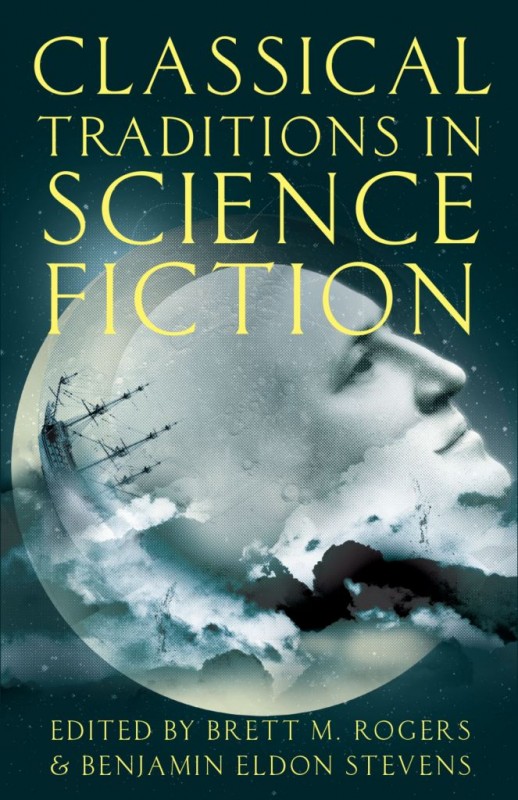The first collection of essays in English about how science fiction draws from the ancient classics
TACOMA, Wash. – For the casual reader, The Hunger Games trilogy may seem light-years removed from life in ancient Rome. In Hollywood’s Blade Runner, the robots who wage war may not quickly bring to mind Greco-Roman myths. And only by knowing about Prometheus’s ill-fated gift of fire to humankind do you see the story parallels with Frankenstein’s monstrous tale.
Yet these links between the old and new are strong, and understanding them and why they matter is one of the many rewards in the new book Classical Traditions in Science Fiction (Oxford University Press, Feb. 2015), co-edited by Brett M. Rogers, of University of Puget Sound; and Benjamin Eldon Stevens, of Bryn Mawr College.
The 400-page volume is the first collection of English-language essays dedicated to how science fiction draws deeply from ancient Greek and Roman mythology, literature, history, and art. It includes 14 essays by professors, authors, and researchers about the classical themes in works including Johannes Kepler’s Somnium, Mary Shelley’s Frankenstein, Jules Verne’s Journey to the Center of the Earth, Frank Herbert’s Dune, and films and videos including Forbidden Planet, Star Trek, Alien Resurrection, and The Hunger Games.
The two editors argue that putting the ancient classics and science fiction side by side shows how “in both cases, we work to imagine a world in ways unlike our own … to see our own world, our present, more clearly.”
Mary Shelley acknowledged her debt to the classics by subtitling Frankenstein “Or, The Modern Prometheus,” referring to the Titan who stole fire, a symbol of technology, and gave it to humankind. In a comparison of the two works, co-editors Rogers and Stevens remark:
“The subsequent punishment of both Prometheus and humankind in the myth-like in Shelley’s haunting novel—makes clear that our relationship to technology is a complicated one: Even as we are awestruck by what we can do, we are asked to wonder how science and technology affect our humanity.”
Why does this question matter? Because in today’s era of wearable technology, personal care robots, anonymous Internet chat, and potential designer babies—it is, without doubt, a discussion well worth having.
Likewise, in Star Trek, Captain James T. Kirk and his Starship Enterprise crew “explored a wide variety of ethical questions, even as they physically explored the universe,” writes contributor George Kovacs in the book. “Motivated neither by financial greed nor by aggressive expansionism … they were meant to depict the best of humanity, evolved from the barbarities of the past” (a “past” which, Kovacs observes, includes the TV viewer’s own present-day).
Again, why does this interpretation matter? Because at a time when terrorists use ideology to justify murdering innocents—it can only be a good thing that books, both ancient and recent, remind us of the universality of certain human questions.
In The Hunger Games trilogy, author Suzanne Collins imagines the future United States modeled on ancient Imperial Rome, in which a small but powerful elite pursues its whims through oppressive, militaristic control. The essay collection’s co-editors note that the story “asks how much we might give up to have access to the technology of a different sort: That is, in the pursuit of safety and security in society, are we sacrificing essential liberties?”
As is true throughout the book, the editors and authors make their observations and conclusions relevant and thought-provoking—and, by the end of each chapter, compellingly argued.
Classical Traditions in Science Fiction is intended for both scholars and science fiction fans. It brings the two audiences together over a book that shares the riches of 400 years of often-portentous science fiction, alongside 2,000-year-old texts of the Iliad, Odyssey, Oedipus Rex, and Aeneid. The book is available at online booksellers and e-readers, including at iTunes, and will be stocked in the University of Puget Sound Bookstore.
Brett M. Rogers is an assistant professor of classics at the University of Puget Sound in Tacoma, Wash. His research focuses on poetics and performance in Greek poetry and drama and classical receptions in contemporary media. He has published a wide range of subjects, from Homer and classical drama to superhero narratives and Buffy the Vampire Slayer.
Benjamin Eldon Stevens is a visiting assistant professor of classics at Bryn Mawr College. He is the author of Silence in Catullus (University of Wisconsin, 2013) and articles on Latin poetry, linguistics, the senses in culture, and comics, in addition to classical receptions. He has taught at Hollins University, the University of Colorado Boulder, and Bard College, including the Bard Prison Initiative.
To purchase Classical Traditions in Science Fiction, visit amazon.com/Classical-Traditions-Science-Fiction-Presences/dp/0190228334 or https://itunes.apple.com/us/book/classical-traditions-in-science/id954862895?mt=11.
Press photos of the co-editors, and the book cover can be downloaded from pugetsound.edu/pressphotos.
Photos on page: Top right: Book cover; Above left: co-editors Brett M. Rogers (left) and Benjamin Eldon Stevens.
Tweet this: Classical Traditions in #ScienceFiction new from Brett Rogers @univpugetsound @beldonstevens @BrynMawrCollege #ctsfmf http://bit.ly/16nAuN8
Follow us on Twitter! twitter.com/univpugetsound

